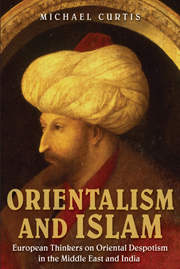Book contents
- Frontmatter
- Contents
- Acknowledgments
- Introduction: What's Past Is Prologue
- 1 European Views of Islam and Their Correlation with Oriental Despotism
- 2 Observant Travelers
- 3 Political Thinkers and the Orient
- 4 The Oriental Despotic Universe of Montesquieu
- 5 Edmund Burke and Despotism in India
- 6 Alexis de Tocqueville and Colonization
- 7 James Mill and John Stuart Mill: Despotism in India
- 8 Karl Marx: The Asiatic Mode of Production and Oriental Despotism
- 9 Max Weber: Patrimonialism as a Political Type
- 10 Conclusion
- Notes
- Select Bibliography
- Index
- References
Select Bibliography
Published online by Cambridge University Press: 05 June 2012
- Frontmatter
- Contents
- Acknowledgments
- Introduction: What's Past Is Prologue
- 1 European Views of Islam and Their Correlation with Oriental Despotism
- 2 Observant Travelers
- 3 Political Thinkers and the Orient
- 4 The Oriental Despotic Universe of Montesquieu
- 5 Edmund Burke and Despotism in India
- 6 Alexis de Tocqueville and Colonization
- 7 James Mill and John Stuart Mill: Despotism in India
- 8 Karl Marx: The Asiatic Mode of Production and Oriental Despotism
- 9 Max Weber: Patrimonialism as a Political Type
- 10 Conclusion
- Notes
- Select Bibliography
- Index
- References
- Type
- Chapter
- Information
- Orientalism and IslamEuropean Thinkers on Oriental Despotism in the Middle East and India, pp. 353 - 366Publisher: Cambridge University PressPrint publication year: 2009

